7667766266
enquiry@shankarias.in
In a recent study published in the journal Environmental Technology and Innovation, researchers have used the power of specific bacterial species to remove organic pollutants from soil.
Despite the use of fungicides & disease-resistant cultivars, fungal infections still cause global crop losses of 10–23% annually, with key calorie crops in India, like rice and wheat, particularly affected.

Reference
The Hindu| Bacterial Mixture for Plant Growth in Contaminated Soil.